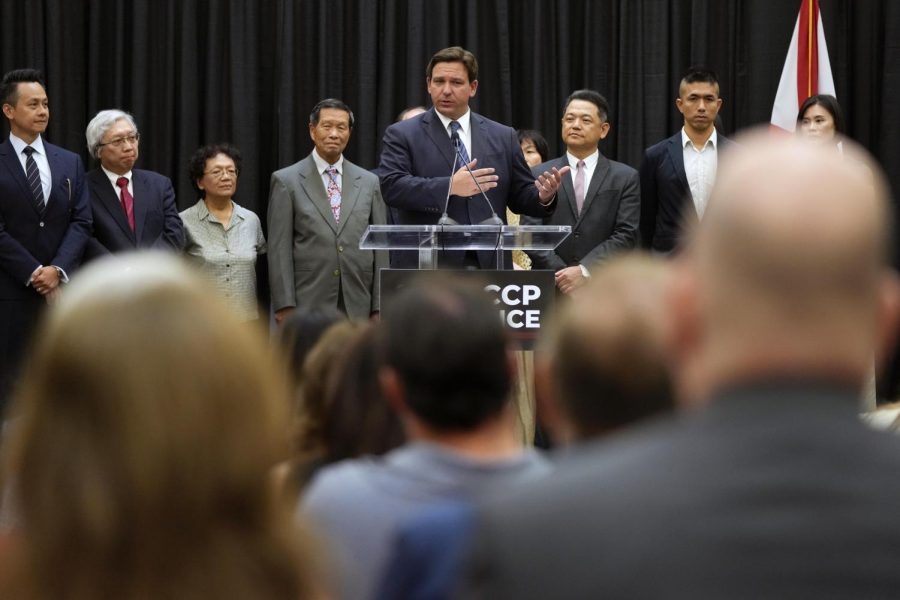DeSantis, other Republicans bus immigrants out of state, stirring controversy
Florida Gov. Ron DeSantis speaks during a press conference, Thursday, Sept. 22, 2022, in Miami. DeSantis, along with Texas Gov. Greg Abbott, have come under fire for bussing Hispanic immigrants out of their respective states into Democratic-leaning ones.
Sep 30, 2022
The partisanship regarding the U.S.-Mexico border has been highly controversial for many years. Recently, some Republican governors have used taxpayer funds to send undocumented immigrants, detained at the border, to Democrat-led cities. These cities include New York City, Washington D.C., Chicago, and most recently, Martha’s Vineyard, an island in Massachusetts.
According to the New York Times, “Since April, Texas has delivered more than 6,200 migrants to the nation’s capital, with Arizona dispatching an additional 1,000 since May.” These actions by Arizona, Texas and Florida governors are meant to protest Democratic policies and the surge of immigrants at the southern border.
These actions have been formulated by the Texas governor, Greg Abbott, who was eager to grasp a political win for the upcoming gubernatorial elections. Through his idea, migrants are given the option of a free bus ride to a selected city, an incentive that is heavily accepted by those who are not able to afford a bus ticket on their own. One recent destination of these busloads was Vice President Kamala Harris’ own house.
According to Abbott’s website, “The buses dropped off over 100 migrants from the countries of Colombia, Cuba, Guyana, Nicaragua, Panama, and Venezuela.” These chosen locations show the eagerness of Republican governors to challenge Democratic leaders. Many view these acts as justified and warranted with the strain on border cities becoming unbearable, while critics view it as a dangerous ploy that uses people as props.
While this is a political move, the migrants and cities involved are struggling to respond. One group involved with aiding the relocated immigrants is SAMU First Response. Tatiana Laborde, SAMU’s managing director, expressed the confusion of these migrants and stated “[they] didn’t understand where they were standing – this is a very residential area.” The cities are also having issues with allocating resources to aid these new migrants. Laborde described the situation as confusing and logistically stressing because of the lack of communication from the Republican governors. New York City’s mayor, Eric Adams, has struggled to provide adequate resources for the migrants without putting stress on other social services. The mayor has established a “tent city”, with five heated tents that will be able to accommodate over 1,000 individuals.
The John Carroll community is incredibly involved with the issues at the southern border and many students have experienced immersion trips to the surrounding communities. Sean Butler ‘22, a graduate student at John Carroll University, spent time at the border during his undergraduate career. According to Butler, these acts “are purely political, with no regard for the human lives involved. These actions were far from being ‘needed’ and will do nothing to ‘help’ migrants.” He feels that there will be no positive solution until the public and legislators are encouraged to make significant legislative changes to immigration. Butler claims that “the U.S. needs a practical immigration policy that allows the country to meet its labor demands while simultaneously building strong independent economic and political institutions across Central America to stymie the reason for migration in the first place.”
Melina Mera ‘24 also shared her experience and views on the situation, describing the experience as “an added stress to an already stressful situation.” Mera provided thoughtful analysis on the issue and whether the migrants are better off in these Democrat-led cities. One on hand, “bosses can [no longer rely on exploiting] them because they have no…fear of being fired or turned in to the authorities [for deportation]. So, in that case, a sanctuary city may be better.” However, Mera also pointed to the support system (i.e. family and Spanish-speaking communities) they had in Texas, “so to relocate them may cause more need for public assistance and more instability in their lives.”













